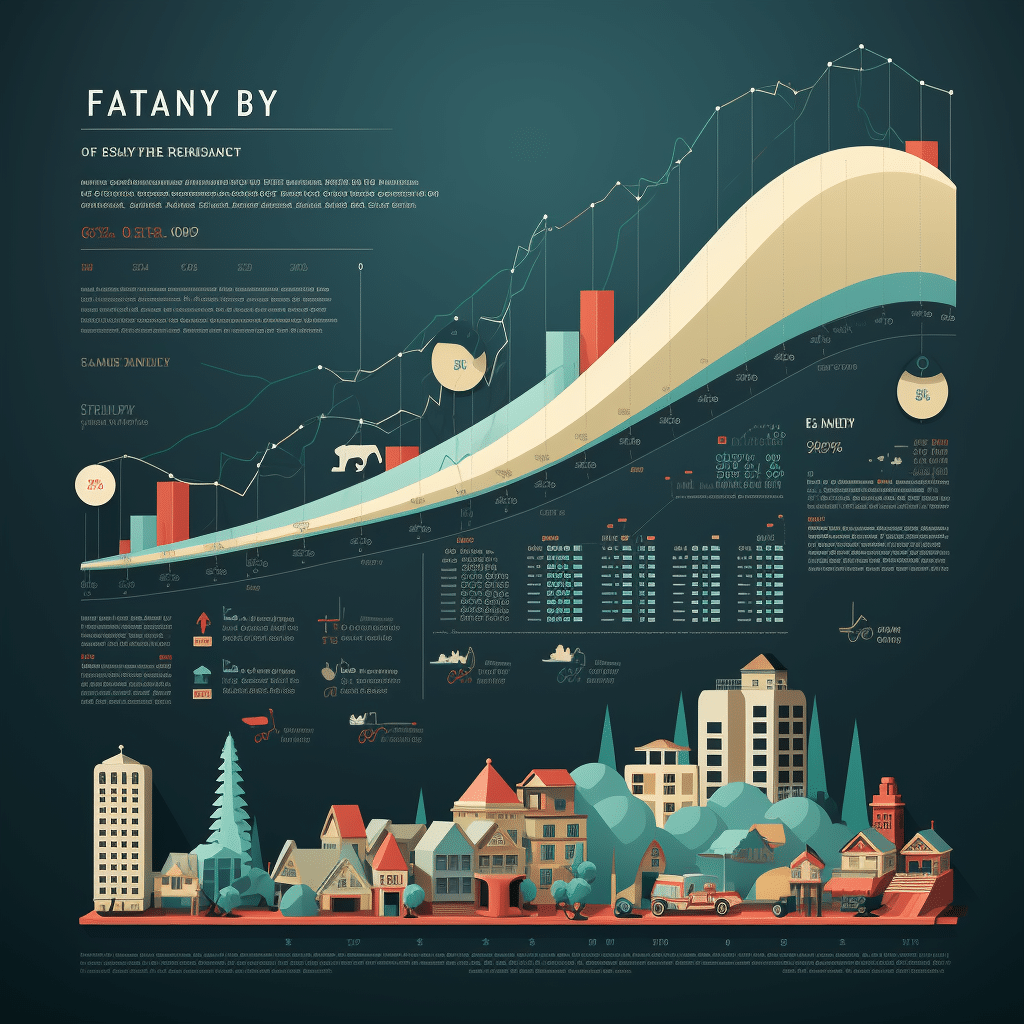Navigating the labyrinth of equity loan rates may feel like deciphering an enigmatic puzzle. But fear not, intrepid homeowners and prospective borrowers! As you embark on this journey to financial understanding, we are here to illuminate the corners and crevices of these seemingly arcane subjects, unraveling the specifics of equity loan rates one thread at a time.

Unraveling Current Equity Loan Rates in The Market
In the ever-evolving market of 2024, equity loan rates continue to play a pivotal role in the decision-making process of homeowners looking to leverage their home’s value. As we dig into the heart of what determines these rates, it becomes apparent that a multitude of factors are at play.

Demystifying the Intricacies of Equity Loan Rate Variables
The biggest head-turner in determining equity loan rates is the Federal Reserve’s movements. Like a maestro conducting an orchestra, their decisions can make the market dance, sway, or pause in anticipation. But, let’s not sugarcoat it—when the Fed hikes rates, it’s not just your latte that gets pricier; your equity loan rate might see a bump too.
Market conditions? True, they’re as changeable as the tide. And 2024’s tides are swayed by a kaleidoscope of economic indicators such as employment figures, inflation rates (yeah, that old chestnut), and even the real estate market’s own ups and downs. These are the bread and butter of savvy lenders setting their home equity loan rates today.
And don’t think for a second that regulatory changes are just boring bureaucratic shifts. Far from it! They can cause a quite stir in the home equity loans rates pond, sending ripples across your monthly budget.
Here’s the skinny: financial gurus are eyeballing a range of indicators, mining data like it’s 1849, and sometimes their forecasts can give us a glimmer of what tomorrow’s home equity fixed loan rates might look like.

| Feature | Description |
|---|---|
| Loan Product | Home Equity Loan |
| Example Loan Amount | $100,000 |
| Example Term | 10 years (120 months) |
| Example Interest Rate | 9.09% fixed-rate |
| Monthly Payment (Example 1) | $1,271.63 |
| Total Interest Paid | $52,596.04 over 10 years |
| Smaller Loan Example | $50,000 loan for 120 months at 8.40% |
| Monthly Payment (Smaller Loan) | $617.26 |
| Collateral | Borrower’s home |
| Disadvantages | Higher interest rate compared to HELOC; risks associated with using home as collateral; potential for credit score damage for missed payments |
| Payment Example Disclaimer | Excludes taxes and insurance premiums |
| Additional Costs | N/A – Vary by lender and specific loan terms |
| Benefits | Fixed repayment term, predictable monthly payments |
The Anatomy of Current Home Equity Loan Rates: A Financial Breakdown
Comparison is the thief of joy, or so they say, but not when it comes to rates for home equity loans. Banking titans like Wells Fargo, Chase, and Bank of America are in a perpetual tango, and their twists and turns result in a patchwork of rates that could work in your favor.
The average interest rate for a 10-year fixed-rate home equity loan recently locked in at a solid 9.09%. It’s worth chewing over how these numbers stack up against the bygone days of yesteryear’s rates. For gossip’s sake, let’s peek into the interest you’d shell out on a $100,000 loan at this rate—brace yourself for a swoon-worthy $52,596.04. Your monthly payment would sashay around $1,271.63.
Choosing between variable and fixed home equity loan rates is like picking your favorite ice cream flavor at the parlor—both splendid, but your choice aligns with your appetite for risk and stability.

Decoding the Best Interest Rate for Home Equity Loan Solutions
Securing that sweet, sweet low interest rate for home equity loan is like nailing a perfect high note—it’s a blend of talent and a smidgeon of luck. Your credit score? That’s your lyrical prowess. Shine bright like a diamond, and lenders might croon lower rates your way.
LTV or loan-to-value ratio—is your financial stage presence. Keep it strong and compelling, and you’ve got leverage to haggle those rates down. Then we’ve got those David-and-Goliath stories where borrowers, armed with nothing but their wits and a solid negotiation script, walked away with a killer deal sliced off their home equity loans rates.
Interest Rates on Home Equity Loans: How They Compare to Other Loan Products
Now here’s the doughnut to your coffee, the cheese to your pizza. If you’re teetering between a home equity loan and, say, refinancing or a personal loan, let’s crunch some numbers. With home equity rates today, they often edge out over alternatives, but it’s not all sunshine and rainbows.
Here comes the kicker: home equity loans might have a heftier interest rate than a home equity line of credit, also known as a Heloc loan rate. Yes, your abode is collateral, and sure as the sun sets, foul up those payments and your credit score will sulk in the corner. But if the terms fit like a glove and the costs make you do a jig, then you’re on the home stretch.
Home Equity Loan Rates Today: Navigating the Current Offers
Feeling the urge to rubberneck at today’s rates home equity loan offers from those bigshot lenders? Look no further. Let’s dish out a snapshot—well, what do you know, Chase is playing ball with competitively low rates. Testimonials buzzing in from consumers who’ve dipped their toes in these waters? You betcha.
Got a financial wizard on hand? Pick their brains! Advice on navigating these offers is worth its weight in gold as part of the grand scheme of your monetary machinations.
How Home Equity Rates Influence Borrowing Patterns and the Real Estate Market
Chasing the dragon of low home equity rates has homeowners snatching at chances for remodeling and renovations like it’s Black Friday. Jump on any home improvement forum, and you’ll spot the trend in lending ticking upwards as rates home equity loan tick downwards.
These rates aren’t just another pretty face on your loan contract; they’re the unseen hand guiding the buying and selling seesaw in the real estate playground. It’s economics, baby—seductive and simple.
A Deep Dive into Interest Rates for Home Equity Loans: Fixed vs. Variable
Staring down the fork in the road between fixed and variable rates can get your heart rate up more than a double espresso. The variable option—oh, she’s a wild one, fluttering along with the market’s whims. Fixed rates, on the other hand, steady as a rock, predictable as your grandpa’s stories.
Tangled up in the choice? Let’s dissect those term lengths. Opt for a brief, whirlwind romance with a short-term, and you’ll find the fixed interest rates for home equity loans a bit beefier. Spread that loan out over a leisurely term, though, and you could nab a more palatable figure.
Projections, anyone? Like a weather forecast, take it with a pinch of salt, but the gurus wielding their economic crystal balls are pointing to a hike in variable rates down the line.
Creative Strategies to Leverage Low Rates Home Equity Loan Offers
Here’s where things get spicy. We’re talkin’ rogue strategies that might just make you the envy of the neighborhood. Imagine diving into a low-rate home equity wellspring and coming up with liquid gold for unique investments. Picture this—a case study of this one brainy borrower who flipped a low-interest loan into a cash cow rental property.
And remember this: having a hotshot home equity loan advisor in your corner? Priceless. They’re the ones who can smell out the best rates like a hound on a fox hunt.
The Ultimate Guide to Comparing Rates for Home Equity Loan Across States
Ever wonder why Alabama’s home equity rates are doing the Charleston while California’s are like a slumbering bear? Geography, darlings. Rates for home equity loans shimmy and shake across the map thanks to a smorgasbord of local factors.
Fancy a visual? Imagine a graph splashed across your screen, peaks and valleys in all their glory showing you where the gold mines of low rates glitter. Borrowers far and wide have tales of triumph and woe to share—just ask Joe from Jersey who hustled a dream rate amidst the notoriously high rates of the Garden State.
Dissecting the Fine Print: Home Equity Loan Fixed Rates’ Terms and Conditions
Terms and conditions—the broccoli of the loan feast. They might not be scrumptious, but boy are they good for you. Unearthing these nuggets can safeguard you from the hidden traps in those seemingly tranquil home equity loan fixed rates.
Lawyer up for this one because it’s heavy lifting. Learning your way through the legalese can mean the difference between a hearty handshake with your lender and a facepalm moment down the line. Some of these terms could even play a sly hand in how friendly that interest rate truly is.
The Future Forecast: Projections for Interest Rates on Home Equity Loans
Let’s don our prophet’s robe and peer into the murky depths of interest rates on home equity loans in the beyond. In 2024, we’re eyeing trends that most Hogwarts graduates couldn’t predict, but the market has its tells.
Economic tides ebb and flow, and preparing for the swing of rates means you’re not left high and dry when the wave hits. Locking in rates today could be a coup or a caper, depending on how the cookie crumbles in the market’s grand casino.
Conclusion: Synthesizing Equity Loan Rates Intelligence for Financial Empowerment
And thus concludes our odyssey through the labyrinth of equity loan rates. The goal was simple, yet grand: to equip you with armor to do battle in the noble quest for the best home equity rate.
Take these key takeaways as your shield: know thy market indicators, comparison is king, terms and conditions are your roadmap, and the future, while shrouded in mist, is not beyond the realm of educated guessing.

So, as you venture forth, waving the banner of newfound intelligence, negotiate with confidence. Carve out your own chapter in the ledger of financial savvy, and may your home equity loan terms be ever in your favor.
Unpacking the Mysteries of Equity Loan Rate
Who doesn’t love a good secret? Especially one that can save you some serious cash? Well, hold onto your seats because we’re about to unveil some juicy tidbits about that ever-so-important figure in the world of homeownership: the equity loan rate.
A Balancing Act
Think of your equity loan rate like a pair of wedge shoes. Just as wedges balance fashion and comfort, your equity loan rate balances your monthly payments with total interest over the life of the loan. Find the right equity loan rate, and you’ll be walking tall without tripping over your finances!
The Heavyweight Champion
Speaking of hefty, did you know that understanding your equity can feel as solid as knowing you’re 130 Pounds in kg? A bit of conversion is all it takes to see how much you’re working with. Convert your home’s value minus any owed mortgage into equity; that’s your borrowing power.
Take the Lead Guitar
Imagine you’re Carlos Santana, and each string on your guitar is a different factor affecting your equity loan rate. To make music, you have to tune each string perfectly. Credit score, debt-to-income ratio, loan-to-value — they all need to be in harmony to nail that sweet, sweet melody of low rates.
Avoiding a Nasty Beat
Watch out for the trap solo of negative amortization, where your loan’s rhythm gets thrown off and suddenly the interest is piling up faster than a drummer’s solo at a rock concert. Stick to the beat and ensure your equity loan rate keeps the interest manageable.
Finding the Sweet Spot
You want the best home equity loan rates, don’t you? Well, they’re not just lying around like lost guitar picks waiting to be picked up. You need to research, compare, and perhaps negotiate to hit that perfect note.
Don’t Let Your Rate Take Off Without You
Ever felt like trying to catch a deal on equity loan rates is like chasing a plane? Don’t let your perfect rate be like southwest 2432 — soaring out of reach just as you arrive at the gate. Stay ahead of the game, and secure your rate before it takes off.
Conclusion
All in all, folks, understanding the secrets of your equity loan rate doesn’t have to be as complicated as rocket science or as boring as watching paint dry. Think of it as a treasure hunt, where every clue you unravel leads you closer to that golden rate, saving you money for the finer things in life. So do your homework, avoid the pitfalls, and may the rates be ever in your favor!

What is the average interest rate on an equity loan?
Alrighty, let’s dive in with some straightforward answers:
What is the monthly payment on a $50000 home equity loan?
Well, the average interest rate on a home equity loan can be a bit of a moving target, varying with market conditions and your credit profile. But, to give you a ballpark, it often hovers around the 5% to 7% range at the time of my knowledge cutoff. Remember, this is just a rough idea, not set in stone.
What is the monthly payment on a $100 000 home equity loan?
For a $50,000 home equity loan, your monthly payment isn’t just one-size-fits-all, mind you. It’ll depend on your interest rate and loan term, but to toss out a number, if you’re eyeing a 10-year term with a 5% interest rate, you’d be looking at around $530 per month. But don’t take my word for gospel—always punch the numbers with your current rate for the real deal.
What is the downside to a home equity loan?
If we’re talking a $100,000 home equity loan, the monthly payment would obviously be a step up compared to our $50,000 scenario. Again, it’s all about your interest rate and loan term, but for that same 10-year term at a 5% rate, you’d be in the ballpark of $1,060 a month. However, your mileage may vary, so grab a calculator and crunch those numbers.
What is the interest rate on a $50000 home equity loan?
Ah, the downside of a home equity loan. Well, if you’re not careful, you might bite off more than you can chew. Because you’re using your home as collateral, if you hit a rough patch and can’t make payments, you could face foreclosure on your humble abode. Plus, there are often closing costs and fees that can add to the overall cost, which can be a real thorn in your side.
What is the payment on a 20000 home equity loan?
The interest rate on a $50,000 home equity loan? Y’know, it’s tough to pin down without more details, ’cause it’s like asking how much a car costs—you need to know the make, model, and year, right? Similarly, rates change with the wind, depending on your credit score and loan term. Generally speaking, you could see rates from below 5% to above 8%. Best to shop around, like hunting for bargains at a flea market.
What is the monthly payment on a $150000 home equity loan?
Okay, what about a $20,000 home equity loan? Well, waving a magic wand isn’t gonna conjure up an exact figure, since it’s different for everyone. But let’s say you’ve snagged a 5% interest rate on a 10-year term. You might be looking at a monthly payment of around $212. But hey, don’t quote me on that—your actual rate is the star of that show.
Can you pay off a home equity loan early?
For a whopper like a $150,000 home equity loan, your monthly payment’s bound to be a bit hefty. With terms and rates being the VIPs, let’s chalk up a scenario of a 20-year term at 5%. You could be dishing out around $990 a month. Again, this is just a rough sketch, so don’t skip doing the math yourself.
Is a home equity loan better than a HELOC?
Can you pay off a home equity loan early? You bet your boots you can! Prepayment penalties have mostly gone the way of the dinosaur, but it’s smart to check with your lender ’cause some might still cling to ’em. Paying it off early can save you a bundle on interest, making it a sweet deal if you can swing it.
Is home equity loan a second mortgage?
When it comes down to it, a home equity loan vs. a HELOC (Home Equity Line of Credit) is like comparing apples to oranges. A home equity loan gives you a lump sum with fixed payments, which can be great for budgeting. A HELOC, on the other hand, offers flexible access to cash with variable interest rates. Better? It’s all about what’s ripe for your financial orchard.
What bank has the best home equity loan?
Yep, a home equity loan is often dressed up as a second mortgage, since it’s a loan you take out against the equity in your home, on top of your primary mortgage. Think of it as a sequel to your original home loan—same house, new deal.
Are home equity loans tax deductible?
The best home equity loan bank is the one that fits like a glove for your financial situation. It’s not a one-size-fits-all kind of deal, buddy. Some banks offer lower rates, others charm you with fewer fees or stellar customer service. Shop around like it’s Black Friday—compare rates, terms, and perks to find your perfect match.
Why is it so hard to get a home equity loan?
Like a delicious tax loophole, yes, home equity loans can be tax-deductible—on the interest paid, to be precise. But hold your horses, it’s only if you’re using the loan to buy, build, or substantially improve your home. And since tax rules can be as twisty as a country back road, always check with a tax professional before counting those chickens.
Will a home equity loan hurt my credit score?
Why so hard to get a home equity loan, you ask? Well, lenders are like overprotective parents—they don’t just hand over the cash without doing a full background check on you. They’ll be poking around your credit score, your income, your debt-to-income ratio, not to mention the equity you’ve got in your home. If any of these don’t look peachy, it could get as tricky as a squirrel on a greased wire.
Is pulling equity out of your house a good idea?
Taking out a home equity loan can be a bit of a double-edged sword for your credit score. Initially, it might dip a bit, what with the hard inquiry and increased debt. But over time, if you’re making regular payments like clockwork, it could actually buff up your score. Just don’t trip over your own feet and miss any payments, or your credit will be crying the blues.
Is 3.5% a good HELOC rate?
Pulling equity out of your house can be as smart as a fox on trivia night—if done right and for the right reasons. It’s a way to convert your equity into cash, which can be perfect for renovations, consolidating debt, or other big expenses. But just like eating chocolate cake for every meal, it’s all good until it isn’t. If you overspend or the home values drop, it might not look like such a sharp idea.
What is the normal term for a home equity loan?
Hold onto your hats, ’cause a 3.5% HELOC rate sounds pretty darn good, especially with rates on the rise like bread in an oven. HELOC rates are usually variable, though, so while 3.5% is great to start with, keep an eye out like a hawk ’cause it could change down the line.
Do home equity loans have better interest rates?
When we’re chatting about the normal term for a home equity loan, think about it like the length of a long-running TV show. Most run between 5 to 30 years—just depends on how long you want to be “tuning in” to those payments.
Can you pay off a home equity loan early?
Home equity loans often flex better interest rates compared to those pesky credit cards or personal loans. Thanks to your house standing as collateral, lenders relax a bit and offer you rates that don’t make you sweat bullets. Just make sure it fits into your financial script, okay?



